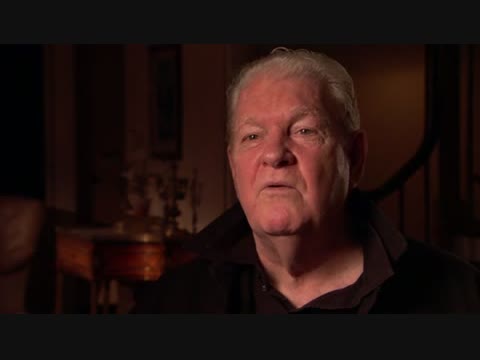American Experience; Stonewall Uprising; Interview with Doric Wilson, 1 of 2
- Series
- American Experience
- Episode
- Stonewall Uprising
- Raw Footage
- Interview with Doric Wilson, 1 of 2
- Producing Organization
- WGBH Educational Foundation
- Contributing Organization
- WGBH (Boston, Massachusetts)
- AAPB ID
- cpb-aacip-15-354f67nc
If you have more information about this item than what is given here, or if you have concerns about this record, we want to know! Contact us, indicating the AAPB ID (cpb-aacip-15-354f67nc).
- Description
- Episode Description
- In the early morning hours of June 28, 1969 police raided the Stonewall Inn, a popular gay bar in the Greenwich Village section of New York City. Such raids were not unusual in the late 1960s, an era when homosexual sex was illegal in every state but Illinois. That night, however, the street erupted into violent protests and street demonstrations that lasted for the next six days. The Stonewall riots, as they came to be known, marked a major turning point in the modern gay civil rights movement in the United States and around the world.
- Raw Footage Description
- In this interview, Doric Wilson discusses his participation in the Stonewall uprising and Gay Liberation movement. Wilson also recalls social repression in the 1950's, including the pressure to marry a woman, McCarthy era culture, and attitudes towards LGBTQ folk on the east vs. west coasts. Other topics include Wilson's experience growing up gay in rural Washington, working as a playwright in New York, and cruising and bar culture in Greenwich Village.
- Date
- 2011
- Rights
- Copyright 2011 WGBH Educational Foundation
- Media type
- Moving Image
- Duration
- 00:31:36
- Credits
-
-
Producing Organization: WGBH Educational Foundation
- AAPB Contributor Holdings
-
WGBH
Identifier: cpb-aacip-665e11d98be (Filename)
Format: DVCPRO: 50
Generation: Original
Duration: 00:31:36
If you have a copy of this asset and would like us to add it to our catalog, please contact us.
- Citations
- Chicago: “American Experience; Stonewall Uprising; Interview with Doric Wilson, 1 of 2,” 2011, WGBH, American Archive of Public Broadcasting (GBH and the Library of Congress), Boston, MA and Washington, DC, accessed February 16, 2026, http://americanarchive.org/catalog/cpb-aacip-15-354f67nc.
- MLA: “American Experience; Stonewall Uprising; Interview with Doric Wilson, 1 of 2.” 2011. WGBH, American Archive of Public Broadcasting (GBH and the Library of Congress), Boston, MA and Washington, DC. Web. February 16, 2026. <http://americanarchive.org/catalog/cpb-aacip-15-354f67nc>.
- APA: American Experience; Stonewall Uprising; Interview with Doric Wilson, 1 of 2. Boston, MA: WGBH, American Archive of Public Broadcasting (GBH and the Library of Congress), Boston, MA and Washington, DC. Retrieved from http://americanarchive.org/catalog/cpb-aacip-15-354f67nc
